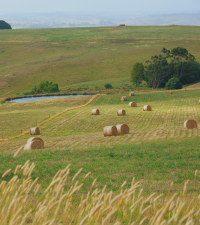
With Climate Week 2024 wrapped up, we’re reflecting on what the event meant for the food industry, the challenges it highlighted, and the opportunities for collaboration that were created.
Our team at HowGood had the privilege of being at the heart of these discussions, as the lead host of Regen House - a Climate Week hub home for conversations around sustainability and food systems.
Food System Discussions with Impact
Regen House was a vital space during Climate Week, creating a home for conversations about food systems, sustainability, and collective action. What made Regen House stand out wasn't just the scope of the discussions but the unique gathering of people from across the food industry – ingredient suppliers, manufacturers, and retailers – all sitting at the same table. This rarely happens, and the power of these conversations became clear: the food industry must move away from isolated, disparate actions and toward collective, unified efforts.
The week’s discussions revolved around the idea that isolated actions such as individual company initiatives or pilot programs, aren't enough to address the scale of the crises we face. Climate, biodiversity loss, geopolitical instability, and cost-of-living challenges are interconnected, and they require a unified approach. The key takeaway? The food industry needs collective action now more than ever.
.jpeg)
Collective Action to Bridge Data Gaps
Another recurring theme was the need for high-quality, scaled data to drive sustainability initiatives. The current system in which brands approach suppliers one-on-one for carbon data is inefficient and unsustainable. HowGood addresses this by enabling collective data gathering and supplier engagement at scale.
“We need collective action to get more high quality, accurate, and primary data. It doesn't work for brands to go one-to-one to their suppliers and get it. With HowGood’s SupplierConnect, we’ve already partnered with some of the most powerful brands in the food industry, and they collectively are asking the same thing from, and using the same platform for, thousands of food suppliers, in order to gather granular product carbon footprint data,” shared HowGood’s Chief Innovation Officer, Ethan Soloviev.
Conversations at Climate Week across the board reinforced that value chain collaboration is the way forward to sustainability impact in the food industry.

Looking Ahead: Opportunities for Action
While there was a lot of forward movement in the industry this year, gaps remain that need addressing. Financial flows, for example, are an ongoing challenge – how can suppliers be supported and incentivized to provide data that helps reduce emissions? How can banks and investors step up to fund regenerative agriculture and sustainability initiatives? These are topics we’ll continue discussion on in the coming months in support of our food and beverage partners.
In addition, discussions about labeling and consumer education revealed that there is still confusion in the market about how to communicate sustainability effectively to consumers. Companies have continued to struggle with messaging without a universal rating system that works well. This is a challenge that the HowGood team is particularly well-positioned to tackle, and we’re excited to continue leading the discussion around solutions.
The energy and high-level collaboration seen during Climate Week were inspiring, but they also underscored the urgency of collective action. As we move forward, HowGood remains committed to providing the tools, data, and partnerships necessary to drive meaningful progress across the food industry.
Learn more about upcoming REGEN HOUSE events at COP16, COP29, and Davos.



.png)
